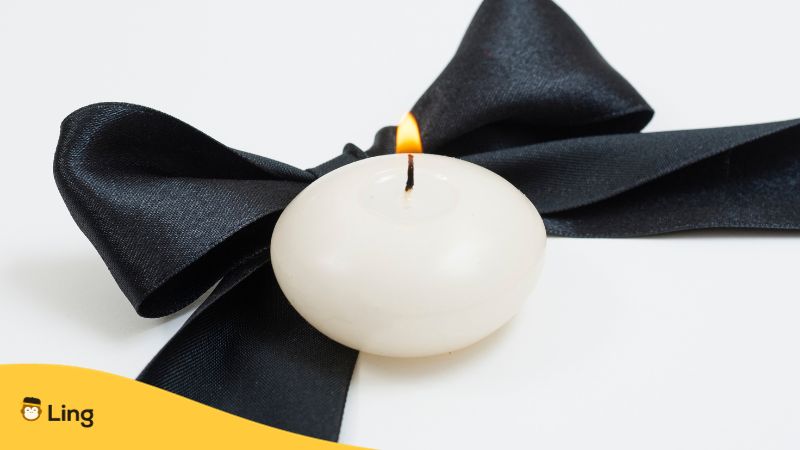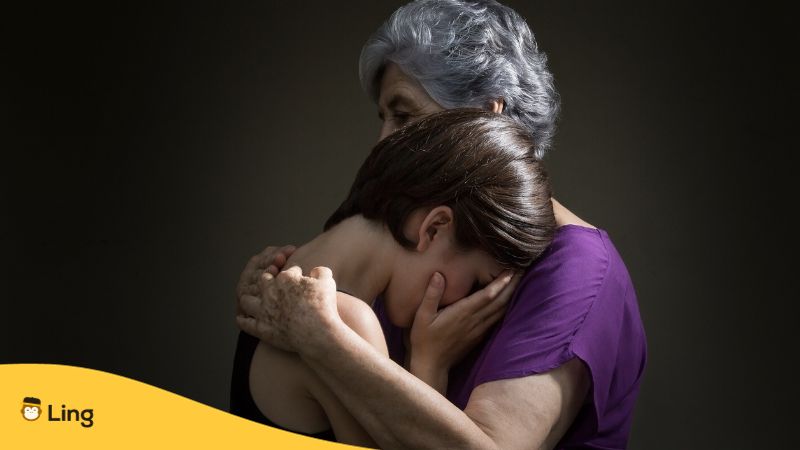Expressing grief in words or actions is never easy. In this article, I’ll help you compose the proper Korean phrases for expressing grief. However, you must remember that regardless of the language you’re speaking, what’s more important is your sincerity in saying your condolences in ways that you can connect to the grieving person or their families on a deeper, more human level. Ready to learn more? Let’s begin!
Cultural Context Of Grief In Korea
Language is more than just a tool for communication. It makes it easier to connect to people, especially when you are from different nations. This is why if you have a Korean acquaintance, friend, or locals you’ve met during your travel who are grieving over their deceased loved ones, they will appreciate it when you know certain Korean phrases for expressing grief.
This is the same with any emotions, like love.
If you are courting a Korean, it will sound more sincere when you tell them “sarang-e bbajyeosseoyo” (사랑에 빠졌어요), meaning “I have fallen in love,” than expressing your feelings in your own language. When expressing painful emotions, especially to a person in an extremely sad mood, what you say becomes a lifebuoy that the other person can cling to. They can hold on to your words and their meaning while the seas (of feelings) are rough.
It’s also interesting to note the unique ways Koreans deal with positive emotions and negative emotions. This may be rooted in their respect for ancestors, family, and social harmony. Specifically, people from South Korea employ a collectivist culture in dealing with grief. Neighbors come together to offer condolences, bring food, and lend a helping hand during times of grief. Friends and extended family members offer emotional support and assistance with funeral arrangements and often take turns staying with the family to provide company.

Essential Korean Phrases For Expressing Grief
So, how do we express grief in the Korean language? Here are some of the perfectly acceptable Korean words and phrases expressing emotions we can use to express our condolences to native Koreans:
I sympathize with you.
Korean Translation: 안타깝게 생각합니다 (An-ta-kap-ge saeng-gak-ham-ni-da)
We extend our condolences and wish for the deceased to rest in peace.
Korean Translation: 삼가 고인의 명복을 빕니다 (Samga goin-ui myeongbogeul bibnida)
May the deceased rest in peace.
Korean translation: 고인의 명복을 빕니다 (Goin-ui myeongbogeul bibnida)
My heart aches.
Korean Translation: 마음이 아파요 (Ma-eum-i a-pa-yo)
I’m so sad I want to cry.
Korean Translation: 슬퍼서 울고 싶어요 (Seul-peo-seo ul-go ship-eo-yo)
I’ll help with anything.
Korean Translation: 무엇이든 도와줄게요 (Mu-eot-i-deun do-wa-jul-ge-yo)
Let’s share our sadness together.
Korean Translation: 같이 슬픔을 나눠요 (Gat-i seul-peom-eul na-ryeo-yo)
You can express these phrases when having a Korean conversation at a funeral, or you want to write something to express your sadness over what happened.
Korean Words Related To Grief
Here are some Korean words that you can also use when having casual conversations in a funeral or similar settings:
| English | Korean Script (Hangul) | Korean Pronunciation |
| Grief | 슬픔 | Seul-peom |
| Heartache | 가슴 아픔 | Ga-seum A-peom |
| Pain | 고통 | Go-tong |
| Condolences | 조의 | Jo-ui |
| Sympathy | 공감 | Gong-gam |
| Mourning | 애도 | Ae-do |
| Loss | 상실 | Sang-sil |
| Grieve | 슬퍼하다 | Seul-peo-ha-da |
| Weep | 울다 | Ul-da |
| Comfort | 위로 | Wi-ro |
| Support | 지원 | Ji-won |
| Empathy | 감정 이입 | Gam-jeong I-ip |
| Funeral | 장례식 | Jang-nye-sik |

The Role Of Non-Verbal Communication In Expressing Grief
Understanding unspoken gestures and body language is crucial for conveying sincerity and respect during moments of sorrow. Here are some of the gestures that will be appreciated by people who lost a loved one or loved ones:
Bowing (인사, In-sa)
In Korea, the depth of the bow translates to the level of respect and sympathy. The deeper the bow is, the greater the respect it shows over someone’s death. So, when you are offering condolences, make a respectful bow first before saying a phrase to express your sympathy.
Offering Gifts (선물, Seon-mul)
Bringing gifts when visiting the bereaved family’s home is a common practice in Korea. These gifts, known as “조의금” (Jo-ui-geum), are typically items like rice, fruit, or money. They symbolize support and the sharing of the family’s burden.
Kneeling (무릎 꿇기, Mu-reup Ggeul-gi)
You may have seen this done in many K-dramas with funeral scenes. People tend to kneel at the gravesite or during formal ceremonies to express their respect.
Facial Expressions
In Korean culture, maintaining a calm and composed facial expression is generally encouraged, particularly in public or formal situations. However, during moments of grief, it’s natural for individuals to show signs of sadness and empathy through subtle facial expressions.
Eye Contact
Some individuals may find prolonged eye contact intrusive, while others may appreciate it as a sign of empathy.
Physical Contact
Physical touch, such as a comforting pat on the back or a gentle hug, can convey support and compassion. However, being mindful of personal boundaries and cultural norms is important. Some Koreans may prefer not to engage in physical contact while still processing the death of a loved one.
Learn More Korean Phrases Expressing Grief With Ling
Learning Korean and other languages, for that matter, is not just about knowing what to say. It also teaches you how to go about it and when to choose silence instead. To learn other Korean words you can use when asked to do a Korean speech at a funeral or other formal events, the fastest way to get this done is by mastering the language with the help of an app like Ling. This application, available for download on both the Play Store and App Store, offers a comprehensive platform to master many foreign languages, including Korean.
Download Ling today and improve your language while understanding more about cultural sensitivity. Learn to convey your condolences in Korean, and in doing so, bridge the gap between languages and cultures during moments of sorrow.



































































